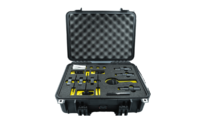Maciej Gołyźniak is a musician who needs no introduction to drum maniacs in his country. He has worked with some of the most successful pop and rock acts in Poland: Emigranci, Ballady i Romanse, Brodka, Sorry Boys, or Natalia Nykiel. The artist has also recorded an album with Mariusz Duda from Riverside and Maciej Meller (ex-Quidam, currently Riverside) under the name of Meler Gołyźniak Duda. He also traveled around the country with a successful drum clinic / workshop tour just before the pandemic hit.
After all this artistic and commercial success (Monika Brodka’s multi-platinum album “Granda” from 2010), the time came for the artist to pursue his own vision of a jazz trio. The first step on the path of the Maciej Gołyźniak Trio was the album titled “The Orchid” (2020), released as part of the prestigious Polish Jazz series. This autumn, the leader and his band are taking the second step, delivering a new release titled “Marianna“.

The album was recorded by a trio, although in reality it was a quartet (the leader, pianist Łukasz Damrych, bassist Robert Szydło and, making a guest appearance, trumpet player Łukasz Korybalski), but sometimes a quintet. Complicated? Because jazz is sometimes a complex form of expression 😉
In the opening track, “Mr. KLX“, we immediately get a solid smack in the face with a riff played by the brass section reminiscent of the 1960s old school. Obviously, the band have done their homework with regard to the Krzysztof Komeda Quintet or Andrzej Trzaskowski Quintet. Maciej has repeatedly mentioned his fascination with Scandinavia. You can hear it in the way he plays the drums, too. At times, it brings to mind Danish drummer Rune Carlsson from Komeda’s “Astigmatic” era. One of the last (if not the last) performances by the legendary saxophone master Zbigniew Namysłowski, who passed away earlier this year, naturally helps to evoke that spirit, as he was a member of Komeda’s quintet in the 60s. Other sections of the song trigger the following association: “Gołyźniak goes funky” (this one stemming from the 70s). Again, that’s thanks to Namysłowski. At times, you can hear an approach similar to Sergiusz Perkowski (the drummer with Andrzej Trzaskowski Quintet, Nahorny Trio, Mieczysław Kosz). At places, there will be a drum cannonade in the style of Billy Cobham or Tony Williams. Let’s make one thing clear, though: we do NOT mean stealing, it’s just a similar way of thinking – a kind of generational continuum. The strong impression made by the track is enhanced by an overdriven bass solo and excellent trumpet parts. By the way, the trumpet plays a significant role on the whole album, not only in this composition, and Łukasz Korybalski (who makes a guest appearance on all of the album), adds perfect color to the music (he also plays the flugelhorn).
After such a “forced entry”, “Stand Still My Dear” turns to the present, thanks to a modern approach to rhythm (Daru Jones and Mark Guiliana come to mind) and a nice, very deep bass sound. Robert Szydło also gets a spot for yet another successful bass solo (“Solaris“) and, again, it’s NOT just another bass solo. Both his solo parts add something to the mix. Lukasz Damrych’s synthesizer parts (partly evocative of the 70s) shine on the aforementioned track. The synths have the warmth so characteristic of the jazz / funk / fusion music of that period.
It should be mentioned that the album as a whole is largely mellow (as many as three ballads out of a total of seven tracks). This is by no means a defect. Each of these tracks is atmospheric, sophisticated and addictive. All the instrumentalists paint their sonic landscapes, while the above-mentioned pianist Łukasz Damrych and trumpeter Łukasz Korybalski are given space to shine melodically. “Where Art Thou?“ is a return to the warmth of the cool jazz of the 1960s. “Mints, Her Favorite” is characterized by minimalism, which does not mean that the composition is any less exquisite. “Exquisite” is probably the best description of the entire content of this album – both in terms of composition, arrangement, performance and production. What is equally important, there is no shortage of emotion either. Speaking of emotion… “I Miss You Grandma” is a great closing track for the album. A touching, musical recollection of Maciej’s late grandmother. I don’t know how the leader is able to keep from bursting into tears when performing this piece live.
From the point of view of the drumming, it is worth noting that Maciek’s second attempt at jazz does not mean a departure from his own playing style. Those who know his work can hear perfectly well who is playing the drums here. Not only because of a characteristic lick or two of his (or three…), but also in the choice of cymbals and the colors that the artist gets out of them. The dense drum part texture in “Inflorescence” is worth paying attention to. It is really a composition within a composition.
The album sounds great. Pure crystal. When listening with headphones on, you have the impression of standing in the middle of the live room with the band recording. It is a sign of the modern. On the other hand, “Marianna” does not lack analog warmth. I don’t know if they recorded onto tape or hard drive. What I do know, however, is that this warmth certainly emanates from the music itself, which pays homage to the old masters, but at the same time proves that the instrumentalists are no strangers to modern trends. In this respect, Robert Szydło (responsible for the mix and mastering) and Maciej Gołyźniak (as executive producer) have done a cracking job.
Assuming that “The Orchid” was Maciej Gołyźniak‘s matriculation, “Marianna” is his MA thesis defended with flying colors. Already waiting for the PhD dissertation…
Vik
Maciej Gołyźniak is officially endorsed by: Zildjian, Sonor and AKG.
https://www.facebook.com/MaciekGolyzniakOfficial









